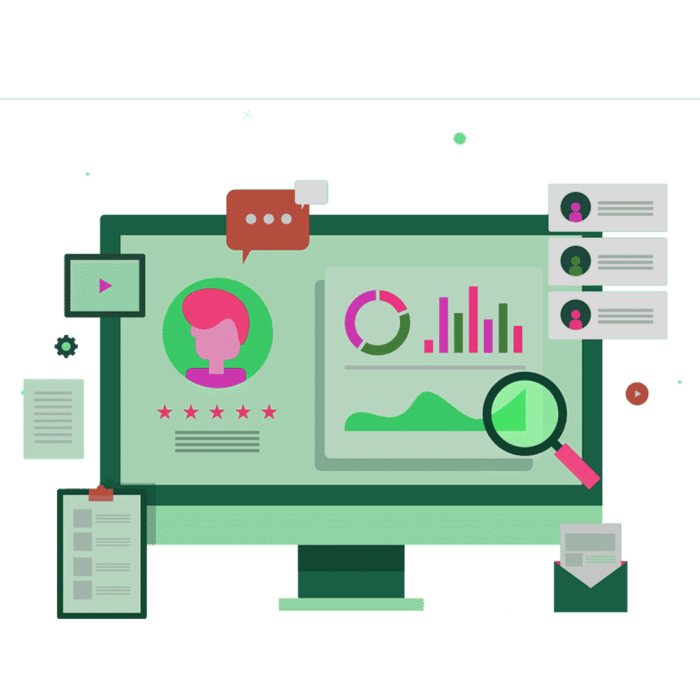Crm software for service business – In today’s competitive landscape, providing exceptional customer service is paramount for the success of any service business. A robust Customer Relationship Management (CRM) system is no longer a luxury but a necessity for efficiently managing customer interactions, streamlining operations, and ultimately driving growth. This comprehensive guide delves into the world of CRM software specifically tailored for service businesses, exploring its key features, benefits, and considerations for implementation.

Source: b-cdn.net
Understanding the Needs of Service Businesses
Service businesses, unlike product-based companies, rely heavily on direct customer interaction and ongoing relationships. This necessitates a CRM system capable of managing diverse aspects, including:
- Appointment Scheduling and Management: Efficiently scheduling, managing, and reminding clients of appointments is crucial. Features like online booking, calendar integration, and automated reminders are essential.
- Service Level Agreements (SLAs): Tracking and managing SLAs is vital for maintaining service quality and meeting client expectations. The CRM should facilitate monitoring progress against agreed-upon timelines and service levels.
- Technician/Agent Dispatching: For field service businesses, efficient dispatching of technicians or agents is key to minimizing response times and optimizing resource allocation. The CRM should offer features like real-time location tracking and optimized routing.
- Communication Management: Seamless communication is critical. The CRM should integrate with various communication channels like email, phone, SMS, and even live chat, providing a unified view of all customer interactions.
- Customer Support Ticket Management: Managing customer inquiries and support requests efficiently is essential. A CRM with a robust ticketing system allows for tracking, prioritization, and resolution of issues.
- Reporting and Analytics: Data-driven decision-making is crucial. The CRM should provide comprehensive reporting and analytics capabilities to track key performance indicators (KPIs) such as customer satisfaction, service efficiency, and revenue generation.
Key Features of CRM Software for Service Businesses
A successful CRM for service businesses should incorporate the following features:
1. Contact Management
A centralized database to store and manage all customer information, including contact details, interaction history, and service history. This ensures consistency and prevents data silos.
2. Appointment Scheduling and Calendar Integration
Streamline appointment scheduling with online booking capabilities, calendar synchronization, and automated reminders. Reduce no-shows and improve efficiency.
3. Service Level Agreement (SLA) Management
Track and manage SLAs to ensure timely service delivery and meet client expectations. Set alerts for approaching deadlines and potential SLA breaches.

Source: perennialis.co
4. Field Service Management (FSM) Capabilities
(For field service businesses) Optimize technician dispatching with real-time location tracking, route optimization, and automated work order assignments.
5. Customer Support Ticketing System, Crm software for service business
Efficiently manage customer inquiries and support requests through a centralized ticketing system, allowing for prioritization, assignment, and tracking of resolution.
6. Communication Management
Integrate multiple communication channels (email, phone, SMS, chat) to provide a unified communication platform and maintain a consistent customer experience.
7. Reporting and Analytics
Gain valuable insights into business performance with comprehensive reporting and analytics dashboards. Track key KPIs such as customer satisfaction, service efficiency, and revenue.
8. Integration with Other Business Tools
Seamless integration with other essential business tools like accounting software, payment gateways, and marketing automation platforms enhances efficiency and data flow.
Choosing the Right CRM Software
Selecting the appropriate CRM requires careful consideration of several factors:
- Business Size and Needs: Small businesses may require simpler solutions, while larger enterprises may need more complex and scalable systems.
- Budget: CRMs vary significantly in pricing, ranging from free options to expensive enterprise-level solutions. Choose a system that aligns with your budget.
- Features and Functionality: Prioritize features that directly address your business needs. Avoid paying for features you won’t use.
- Scalability and Flexibility: Choose a system that can adapt to your business growth and evolving needs.
- Ease of Use and User Interface: A user-friendly interface ensures smooth adoption and minimizes training time.
- Integration Capabilities: Consider the system’s ability to integrate with other business tools you currently use.
- Customer Support and Training: Reliable customer support and training resources are crucial for successful implementation and ongoing usage.
Benefits of Using CRM Software for Service Businesses
Implementing a CRM system offers numerous benefits:
- Improved Customer Satisfaction: Personalized service and efficient issue resolution lead to higher customer satisfaction.
- Increased Efficiency and Productivity: Streamlined workflows and automated tasks free up time for more valuable activities.
- Better Team Collaboration: Centralized information and communication tools improve team collaboration and coordination.
- Enhanced Sales and Revenue Generation: Improved customer relationships and targeted marketing efforts drive sales growth.
- Data-Driven Decision Making: Comprehensive reporting and analytics provide valuable insights for informed business decisions.
- Reduced Operational Costs: Improved efficiency and automation lead to reduced operational costs.
- Improved Customer Retention: Personalized service and proactive communication foster stronger customer relationships and increase retention rates.
Frequently Asked Questions (FAQ)
- Q: What is the best CRM for a small service business? A: The best CRM depends on your specific needs and budget. Consider options like HubSpot CRM (free plan available), Zoho CRM, or Freshdesk.
- Q: How much does CRM software cost? A: Pricing varies greatly depending on the features, scalability, and vendor. Costs can range from free to thousands of dollars per month.
- Q: How long does it take to implement a CRM? A: Implementation time depends on the complexity of the system and your business needs. It can range from a few weeks to several months.
- Q: What are the key metrics to track in a service CRM? A: Key metrics include customer satisfaction (CSAT), Net Promoter Score (NPS), average resolution time, first contact resolution rate, and service level adherence.
- Q: Can a CRM integrate with my existing software? A: Many CRMs offer integration capabilities with popular business tools. Check the vendor’s documentation to see if your existing software is compatible.
Conclusion
Investing in a robust CRM system is a strategic move for any service business aiming to enhance customer relationships, streamline operations, and drive growth. By carefully considering your business needs, selecting the right features, and implementing the system effectively, you can unlock the full potential of your CRM and gain a significant competitive advantage.
References: Crm Software For Service Business
Call to Action
Ready to transform your service business with a powerful CRM? Contact us today for a free consultation and let us help you find the perfect solution to meet your unique needs.
Questions and Answers
What are the key features to look for in CRM software for a service business?
Key features include contact management, service scheduling, project management capabilities, reporting and analytics dashboards, and ideally, integration with other business tools.
How much does CRM software typically cost?
Pricing varies greatly depending on the vendor, features, and number of users. Options range from affordable cloud-based solutions to more expensive enterprise-level systems. Many vendors offer tiered pricing plans.
How long does it take to implement CRM software?
Implementation time depends on the complexity of the system and the size of the business. Smaller businesses might implement a system in a few weeks, while larger organizations may require several months.
What is the best way to train employees on new CRM software?
Effective training involves a combination of online tutorials, hands-on workshops, and ongoing support. Many vendors provide training resources as part of their service packages.
